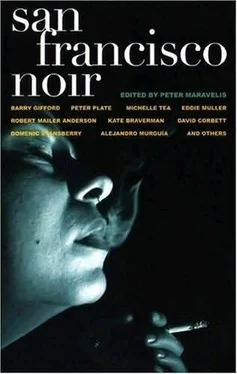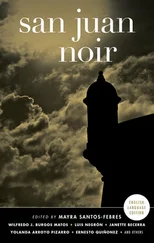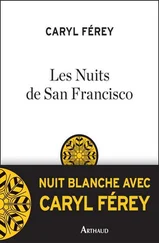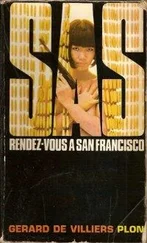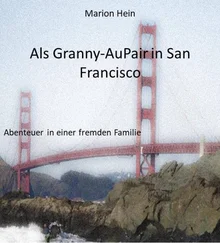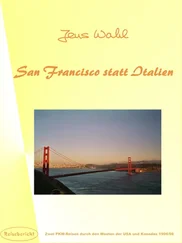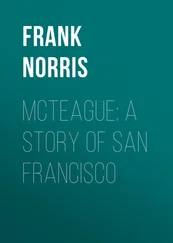Zoë is shocked. She stares at Clarissa. Even with Gucci sunglasses, there’s a distinct softening around the chin, a loss of definition in her cheeks. “No, dear potential cousin. I have hepatitis C. And you need to get your face done.”
“What part?” Clarissa is concerned.
They are walking from the pier toward a tattoo parlor on Columbus Avenue. Shops offer stacks of cheap plaster statues, saints and children, dwarves and frogs. Someone will purchase and paint these objects, display them, give them as gifts. And plastic replicas of Alcatraz and T-shirts that say Prisoner and Psycho Ward .
“What part?” Zoë repeats. “It isn’t a fucking contract. It’s a composition. Just give the guy a blank check. And don’t use a Pacific Heights or Marin surgeon. You’ll end up looking like everybody else. I found an Italian in Pittsburgh.”
“I noticed you finally got your father off your face,” Clarissa slowly admits.
“Well, the police wouldn’t do it,” Zoë says. “And Mommy was so busy.”
Slow swells are below the wharf now. The bay is a liquid representation of fall. It’s in continual transition. It’s a form of treachery. All fluid bodies are autumnal and promise betrayal. That’s what leaves changing mean, the reds and ochre, the yellows like lanterns. It’s about packing and disappearing. It’s a season for divestiture. That’s the fundamental imperative winds hint at. Time of the severing. That’s the obvious subtext. And it occurs to Zoë that her elation could dissipate. Emotions have their own seasons, inexplicable currents and random lightning storms.
Zoë follows Clarissa into the tattoo parlor. “Let’s rock,” Clarissa says. “Lock and load.”
The Eagles are playing. It’s “Hotel California,” of course. A tanned man with a blond ponytail who looks like a yoga instructor opens a book of designs. Dragons. Butterflies. Demons. Flowers. Guitars. Spiders. Zoë vaguely remembers negotiations including the procurement of a fifth of vodka, tomato juice, and a complicated argument about the aesthetic implications of script choices. Eventually they selected a gothic font. Then she may have passed out.
Zoë realizes they are in an arcade on Pier 39. It’s three hours and six Bloody Marys later. They have gauze and adhesive tape on their shoulders where their names are carved into their left upper arms in identical navy-blue. They decided to leave the encircling heart in red ink for their next reunion. Banks of garish video games surround them; hip-hop music blasts from speakers in the ceilings and floors. Boys who all look part Asian or Mexican are armed with laser levers and plastic machine guns. They keep the real Glocks in their pockets.
“This is not the global village I envisioned,” Zoë says.
“That’s politically incorrect enough to get me disbarred,” Clarissa whispers. She places two fingers against her red lacquered lips in a gesture of mock fright.
The automatic photographic booth is on the far side of the arcade. Four shots. They have been taking pictures here since they rode buses and walked from Daly City in seventh grade. Zoë remembers when it cost a quarter. Now it takes dollars. This photographic session is a ritual element in each of their meetings. It’s their sacrament. When they leave the booth, they cut the strip in half. Zoë saves her photographs in a shoebox where she keeps her passport and birth certifi-cate. She assumes Clarissa saves hers in her jewelry vault. Or perhaps she just throws them away.
The photographs are a necessary component of their liturgy. Zoë knows they can only see one another by laminated representations. It would be too disturbing and intrusive if they could actually perceive one another without artificial mediation. They communicate by email, fax, and newspaper clippings. The telephone is unbearable. They only use it to arrange an imminent unplanned meeting.
“Marvin’s jowls are definitely gone.” Clarissa studies the thin strip of four facial shots. “You have cheekbones. Are those implants? Jesus. You’re gorgeous. You never looked this good, not at sixteen, even. Cosmetic surgery already.”
“We’re breathing on forty,” Zoë says, bewildered. Certainly Clarissa comprehends the necessity of proactive facial procedures. This is San Francisco and Clarissa is an entertainment business attorney with a penthouse office above a Chinese bank. Is Clarissa in denial? Are her medications interfering with her functioning on so obvious and rudimentary a level?
“I thought you had to wait as long as possible.” Clarissa’s words are slurred.
“After you psychologically remove the slap across the face, and its more damaging verbal resonances-” Zoë begins.
“And that takes decades and costs what? A quarter of a million?” Clarissa is still staring at the strip of photographs.
“Then the next step is actual surgical removal. It’s a natural progression. It’s how to treat emotional cancer. Keep them,” Zoë says. “Get some reference points.”
They sit on a bench on the south side of the pier, sun tamed and restrained. The water is becoming agitated. White caps like mouths opening, baring teeth. The bay reminds Zoe of women in autumn in a medical imaging office. First the locker, the paper bathrobe, the chatty blonde with the clipboard who walks you into the room containing the mammogram machines. Then the stasis before the X-rays are read. Yes, the bay is waiting for its results. Poppies encrusted with resins or blood float like prayer offerings in the dangerous toxic waters.
“We used to walk here. What were we? Eleven, twelve?” Clarissa asks. Her mood is also shifting. They’re both still drunk.
Zoë and Clarissa, gauze and bandages on their shoulders, hold hands. Zoë’s childhood is sequences of yellows composed of trailer park kitchen cabinets and the invisible poisons leaking from the pores of fathers undergoing chemotherapy. Take a breath of rancid lemon. You’ve seen the Pacific, reached the end of the trail and don’t linger at the edges of death too long. They had a final punctuation for that. It was called the iron lung.
“They hadn’t invented a vocabulary for us yet,” Clarissa says to the waves. “Dysfunctional families. Latchkey children. Remember when I lost my key? What my father did? Jerry tied me up in the carport in pajamas for a week.”
“I brought you a canteen with orange juice. A bottle of vitamins,” Zoë recalls. “And a few joints. I cut up a cantaloupe in tiny pieces. You were handcuffed. I fed you like a sick bird.”
“How did you get a canteen?” Clarissa asks.
“I took it from the hospital outpatient closet,” Zoë says. Her head is throbbing.
She stares at sea swells that are the process by which autumn becomes water. If you understand the bay, it smells of slow-burning cedar. Midnight currents are actually leaves brushing the ocean with russet and amber. Only adepts recognize this. Waves answer to the moon and immutable laws of spin and fall. They don’t get dinner on the table at the appointed hour. They don’t carpool or pick up the suits on time, have the cuff links and invitations ready.
“Only you know,” Clarissa says. She looks like she may vomit again.
Zoë nods. Yes, only I was at ground zero when it happened. This is why we tattooed ourselves. Who else could comprehend adolescence in the margins of a hardscrabble town in the conceptual latitudes? The late ’50s and their village was subdivided wood frame houses and stucco bungalows nailed in rows like the fruit trees above gashes of alley, oranges and lemons so bitter they burned your mouth.
“We sat next to each other in homeroom,” Zoë says.
It was seventh grade and they were learning about cities. Their names were Sherry and Judy then but they do not ever mention this.
Читать дальше
